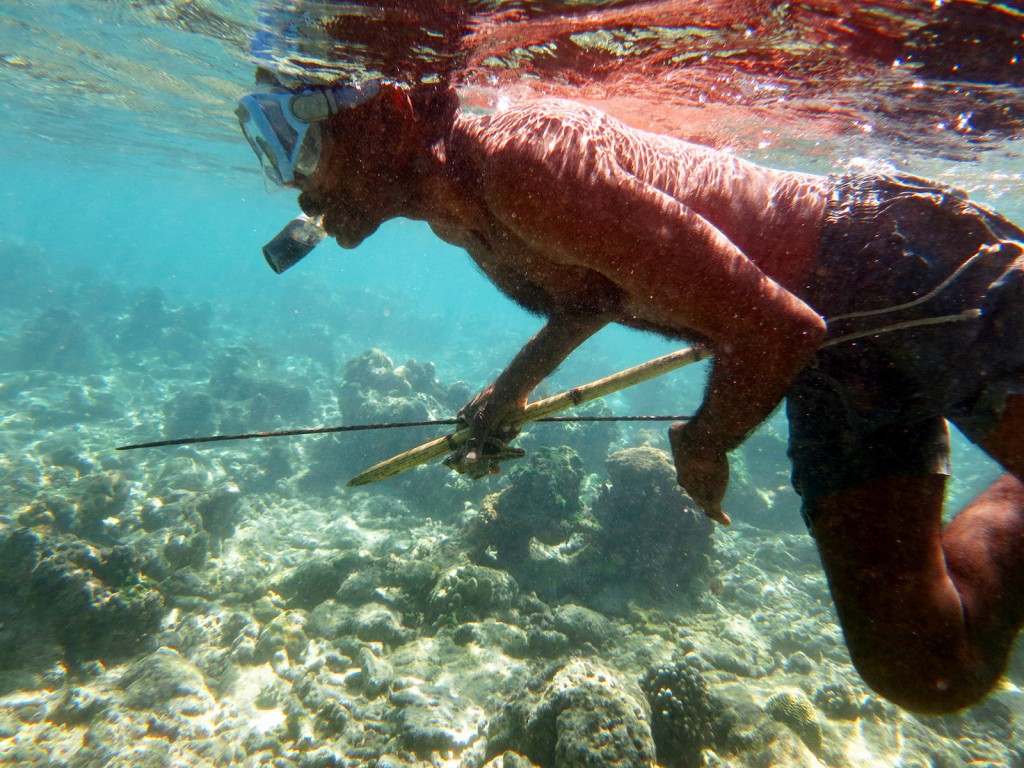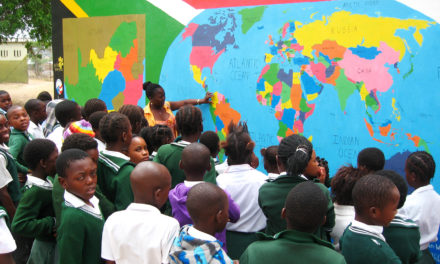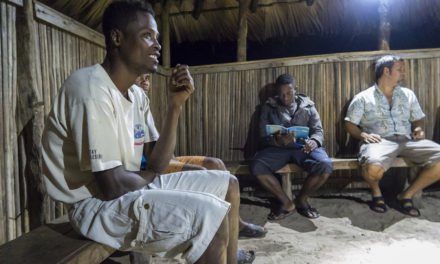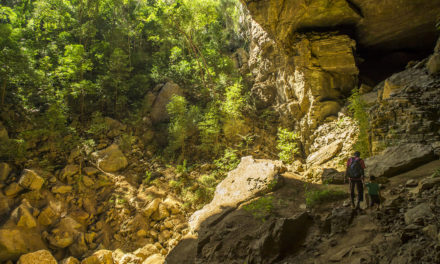W e were all packed and ready. There was a lot to do. In less than two months our team would arrive and we needed to make one last trip to and from the mainland to get the final items for stocking their homes. Our passengers were showing up with more and more bags of dried fish and coconuts to sell at the port. Many people on Nosy Mitsio were near the end of their stocks of rice and they desperately needed to make the trip in order to resupply from the mainland. At any time the northeast wind would calm and eventually stop, we’d load up and leave.
So we waited…
On a typical day the northeast wind blows in the morning, calms down around noon, and switches over to the west wind soon after. It’s not wise (even with our boat’s strong motor) to go against contrary winds that send the boat rocking up and down through ever more precarious waves, especially when we have a full load of people and luggage. So we waited, and we kept waiting, but the west wind we all expected never came. Day after day the northeast wind seemed to blow harder and harder to the point where it even became difficult to open our front door against it.
The wait stretched into its third day. Our passengers unfailingly arrived every morning and each day they waited until late afternoon, in hopes that the wind would change. On one of these mornings when the northeast wind was blowing as hard as ever, I was chatting with the king. Though normally a very soft-spoken and indirect man, this day he seemed particularly on-edge. Loudly and directly he said, “The west wind is here!” I was confused as I looked up at the coconut trees that were still bending heavily under the angry fury of the northeast wind. “You mean it’s coming? Because it’s clear that the northeast wind is still blowing hard,” I said. “No, I can see the west wind is here!” he retorted emphatically. I was quite irritated at this obvious contradiction (on top of all the waiting itself), but according to how the king was reading the sky and the clouds, he was sure that this was the day to leave.

A boy on Nosy Mitsio taking advantage of the northeast winds to launch his homemade canoe out into the ocean!
But we didn’t. Nothing changed that day, and if anything the wind just blew harder. Three days turned into one week. People were becoming anxious as their stocks of rice became too low for comfort. Others were going to miss a big ancestral ceremony on the mainland, where they hoped to secure blessings for the coming year. How much longer would this continue?
And then the wind stopped. Our first break in a week had come! We unanchored the boat, loaded everyone and everything up as quickly as we could and took off. Waving goodbye to the kids on shore, our hopes were high. Not two minutes after departing, we hear someone say in exasperation, “The northeast wind is back!” We felt the breeze but didn’t want to believe. Looking for proof, we all glanced at the shore, and sure enough, the coconut trees were once again bending over in its fury. It was not safe for us to continue and the only thing for us to do was to turn right back around. We all looked at each other with great disappointment.
S o we continued the wait. Toting all their luggage along, our passengers showed up every day without fail, often arriving early in the morning when the wind was blowing its hardest. I was always baffled and never could understand why they didn’t wait to come when the wind calmed. After more than a week of unfruitful waiting, it seemed like a waste of time and effort that they would keep lugging their bags to our village in strong winds, just to wait out most of the day before returning home again. But they just kept holding onto some hope or sign in the sky that this would be the day for the west wind to come. Every day, we talked about the same things: the rice is nearly finished, the dried fish have been bagged up too long, and when is the west wind coming? Some said the relentless northeast wind is a curse brought on by someone breaking an ancestral taboo, and talked of punishment for the perpetrator, to appease the ancestors and bring back their blessings along with a change of wind.
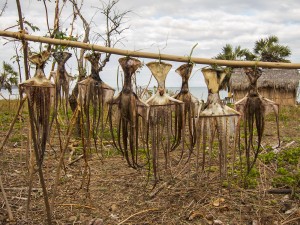
Octopus drying on Nosy Mitsio. Many people thought someone had incorrectly hung their octopus to dry (violating a taboo) and that the unending northeast winds were a curse for breaking that taboo.
Mostly though, we just looked at the sky to see if today would be the day the west wind returns. I can’t tell you how many times someone looked or pointed and said “It’s here! The west wind is already here!” all the while the trees over our heads bent near to breaking under the unrelenting northeast wind. I know I’ve never paid so much attention to the wind in my entire life. But in looking for a sign that things would finally change, it wasn’t as simple as just looking at the trees above us anymore. We studied the clouds on the western horizon: were they coming towards us, going somewhere else, or simply dissipating? How were the clouds in the east: were they heavy and thick or light and sparse; how fast were they moving? What news was there from the south of Nosy Mitsio; might the west wind be reaching them and not us in the north? We all looked for signs and many saw the signs they desired, yet every day was the same: the northeast wind blew all through the day and all through the night, never letting up.
One week turned into two weeks. People were becoming visibly tense. Their rice was finished and they needed to get to the mainland soon. Time was running short for us as well, and the longer we stayed on Nosy Mitsio, the harder it would be for us to make the necessary preparations for the arrival of our team.
Then after two weeks of waiting, the west wind we had been expecting and anticipating finally came. It came out of nowhere and it came strong! We all jumped into the boat and raced across the sea to get to the mainland port before the northeast wind decided to come back again. We made it!
D uring those two weeks of waiting, I learned a lot by observing the words and actions of the people around me. When I was talking to the king that day about the wind, he didn’t say “Maybe the wind will change” or “We’ll see” or even that it would come in the near future. To him it was already there because he’d been looking for it and saw some evidence in the sky. And despite how bad the wind would blow, the passengers showed up every day as if they were going to leave. They were ready to jump in the boat at a moment’s notice.
In our neighbors on Nosy Mitsio, I observed the true essence of anticipation. Despite what was happening contrary to what they expected, they continued to speak and act in ways that made their expectation a reality. The west wind may have taken a very long time to arrive, but every day they were prepared for its arrival. They saw its signs out upon the horizon. The west wind was within sight, just not yet within reach. Anticipation is when you know something will happen and you act as if it is already happening.
Take for example the parable of the bridesmaids in Matthew 25. They went out to wait for the bridegroom to arrive but he didn’t come right away. It wasn’t until the middle of the night that he arrived. Five of the bridesmaids had anticipated his arrival well and they were prepared for the wait, whether it be long or short. But the other five were not ready and waiting in anticipation when the bridegroom arrived; the feast started without them and they were too late to get in.
I know that if our passengers had not been so diligent about showing up and if they had not been there ready when we loaded the boat, we would’ve had to leave without them. The window of opportunity may have been too slim and we couldn’t wait around. Our passengers’ anticipation didn’t falter when the northeast wind didn’t stop, even after two weeks of waiting.
The Kingdom of God is all about anticipation. In Matthew 24, Jesus told his audience to always be waiting, to not be caught off guard. There are signs in the skies and signs in the seasons, and they tell us when something is near. It may not be the day we expect, but we’re to wait every day expectantly. In Matthew 25, following the parable of the ten bridesmaids is the parable of the talents. In this parable, Jesus tells us that to wait on him with anticipation is to act as though he’s already returned. We don’t know how long the wait will be, but we want to be ready for his arrival, making the most of every day so that when he returns we’ll be ready for him.
J esus is telling us to be ready. It was through Jesus’s entrance into the world, his death and his resurrection that his Kingdom ripped through the darkness to bring redemption, new life and new beginnings. Even before his death and resurrection, Jesus boldly proclaimed his good news: “The Kingdom of God has come near!” Although it’s not yet covering the earth, we see bits and pieces and evidence of it here and there. Despite how so much around us points to the contrary, to the pain and brokenness and despair that encompasses the world, Jesus asks us to pay attention to what he’s doing and to look for signs of the changing wind. He asks us to act in ways as if it was already complete, to wait with readiness, to gather our oil and pack our bags. We live in the Kingdom that’s coming by living as if it’s already here. And like the king, let us say in confidence: “It’s here!” The Kingdom of God is already here!
In Christ,
Lora, Adam, and Matimu
P.S. As I mentioned in my last newsletter, we’ve done a lot of preparation and waiting this year. We’ve waited for our home, for our boat, and we’ve waited patiently for the people of Nosy Mitsio to warm up to us. But the biggest thing we’ve prepared for and have been waiting for is our team. In just two weeks they’re arriving in Madagascar and we will no longer be alone as bringers of light into this corner of the world. Please pray for strength as they will be thrown into a totally different way of life and that the power of the Holy Spirit would rest on them in every encounter they have.


